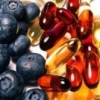Her studies:
A Dietary Supplement Abolishes Age-Related Cognitive Decline in Transgenic Mice Expressing Elevated Free Radical Processes
J.A. Lemon*, D.R. Boreham{dagger} and C.D. Rollo*,1
* Departments of Biology and
{dagger} Medical Physics and Applied Radiation Sciences Unit, McMaster University, Hamilton Ontario, Canada L8S 4K1
We previously found that transgenic mice overexpressing growth hormone (TGM) have elevated and progressively increasing free radical processes in brain that strongly correlates with reduced survivorship. Young mature TGM, however, displayed vastly enhanced learning of an eight-choice cued maze and qualitatively different learning curves than normal controls. Here we document the age-related patterns in learning ability of TGM and normal mice. Learning appeared inferior in both genotypes of very young mice but TGM were confirmed to be superior to normal mice upon maturity. Older TGM, however, showed rapid age-related loss of their exceptional learning, whereas normal mice at 1 year of age showed little change. The cognitive decline of TGM was abolished by a complex "anti-aging" dietary supplement formulated to promote membrane and mitochondrial integrity, increase insulin sensitivity, reduce reactive oxygen and nitrogen species, and ameliorate inflammation. Results are discussed in the context of reactive oxygen and nitrogen species, long-term potentiation, learning, aging and neuropathology, based on known impacts of the growth hormone axis on the brain, and characteristics of TGM.
http://www.ebmonline...tract/228/7/800A Complex Dietary Supplement Extends Longevity of Mice
Jennifer A. Lemon1,, Douglas R. Boreham2 and C. David Rollo1
1 Departments of Biology
2 Medical Physics and Applied Radiation Sciences, McMaster University, Hamilton, Ontario, Canada.
Address correspondence to Jennifer Lemon, Department of Biology, McMaster University, 1280 Main Street West, Hamilton, ON, Canada L8S 4K1. E-mail: lemonja@mcmaster.ca
Key factors implicated in aging include reactive oxygen species, inflammatory processes, insulin resistance, and mitochondrial dysfunction. All are exaggerated in transgenic growth hormone mice (TGM), which display a syndrome resembling accelerated aging. We formulated a complex dietary supplement containing 31 ingredients known to ameliorate all of the above features. We previously showed that this supplement completely abolished the severe age-related cognitive decline expressed by untreated TGM. Here we report that longevity of both TGM and normal mice is extended by this supplement. Treated TGM showed a 28% increase (p <.00008) in mean longevity. An 11% increase in mean longevity was also significant (p <.002093) for treated normal mice, compared to untreated normal mice. These data support the hypothesis that TGM are a model of accelerated aging, and demonstrate that complex dietary supplements may be effective in ameliorating aging or age-related pathologies where simpler formulations have generally failed.
So, its only 11% for non-transgenic mice. (I'm glad they included this number where as I am very skeptical of making a genetic problem and then fixing the problem). 11% from 31 supplements isn't that amazing, there are quite a few studies of one supplement alterations that get close to 11% lifespan extension.
Supplement Mixture:
Vitamin B1b 0.72 mg/day
Flax Seed oilh 21.6 mg/day
Vitamin B3b 0.72 mg/day
Folic Acidb 0.01 mg/day
Vitamin B6b 0.72 mg/day
Garlicb 21.6 mcg/day
Vitamin B12b 0.72 mcg/day
Gingerh 7.2 mg/day
Vitamin Cb 3.6 mg/day
Gingko Bilobah 1.44 mg/day
Vitamin Db 2.5 IU/day
Ginseng (Canadian)h 8.64 mg/day
Vitamin Eb 1.44 IU/day
Green Tea Extractsf 7.2 mg/day
Acetyl L-Carnitinec 14.4 mg/day
L-Glutathionea 0.36 mg/day
Alpha-Lipoic Acide 0.72 mg/day
Magnesiumb 0.72 mg/day
ASAd 2.5 mg/day
Melatoning 0.01 mg/day
Beta Caroteneb 50.0 IU/day
N-Acetyl Cysteinee 7.2 mg/day
Bioflavinoidsh 4.32 mg/day
Potassiumb 0.36 mg/day
Chromium Picolinatei 1.44 mcg/day
Rutinh 0.72 mg/day
Cod Liver Oil 5.04 IU/day
Selenium 1.08 mcg/day
CoEnzyme Q10h 0.44 mg/day
Zinc (chelated) 0.14 mg/day
DHEAg 0.15 mg/day
So its a pretty long list for 11%. Better than dying earlier though. There are some rogue letters in the above table. I guess that the work is more impressive for preventing brain dysfunction as the mice age.


















































